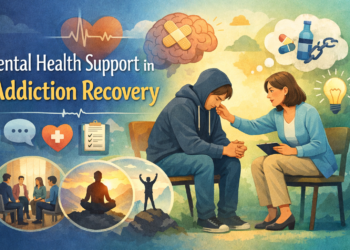Anyone that has worked in a stressful work environment has experienced a level of pressure or anxiety. Many businesses pride themselves on their ability to work hard and rest little, but is this mentality harming their employees and productivity? When creating a workplace game plan, most businesses focus on customer support, internal workflows, diversification, and other necessary aspects. However, companies could benefit from switching their focus to their employee’s mental health. Promoting inclusive mental health can create a better work environment and better employees.
What is Inclusive Mental Health?
According to MentalHealth.gov, mental health is an individual’s emotional, psychological, and social well-being. Your mental health determines the way that you react to life’s circumstances. Countless people live with mental health problems or issues today; this can include anxiety, depression, Post Traumatic Stress Disorder, Obsessive-Compulsive Disorder, Intermittent Explosive Disorder, etc. Approximately 1 in 5 adults has experienced some type of mental illness or disorder. With the commonality of mental health problems in today’s society, it is odd that we don’t see more inclusion within the workplace.
Inclusive mental health is the acceptance of anyone and everyone that has dealt with a mental health disorder. For example, a person’s age/sex/race/identity should not decrease their access to available treatments. Inclusive mental health is accepting all people and offering the appropriate care. What is the importance of inclusive mental health, and how can it improve your workplace environment?
How Can Inclusive Mental Health Improve Your Workplace Environment?

Creating a workplace that encourages inclusive mental health means understanding that employees may experience hardships and that resources should be available to everyone. No one should feel that they are not offered aid because of who they are or who they work for. Mental health inclusion can mean providing knowledgeable articles, access to counselors, mental health days off, and a sense of community among employees.
It Encourages a Healthy Work-Life Balance
By offering employees various resources to improve their well-being, they are more likely to feel secure in their path. For example, an employee that struggles to balance their workload, social life, family obligations, and educational pursuits could greatly benefit from a mental health day off. This allows them to take a day to completely recharge and prepare for work. It is far more beneficial for a business to have recharged workers than worn-out employees.
It Boosts Spirits and Productivity
When a business instills an atmosphere of acceptance and encouragement, the employees will only reap the benefits. Employees that feel comfortable taking a day off or approaching their boss with a mental health issue are more likely to give their company a 110%. Good work culture is what drives many people to productivity. A sense of trust and community will spark productivity more than deadlines and threats. Offering inclusive mental health resources is a great way to boost spirits and encourage productivity.
It Breaks Stigmas and Increases Communication
Businesses that break down the wall of silence inspire employees to share their thoughts and ideas. By creating an open line of communication and a welcoming environment, leaders will see more interaction among their workers. With an increase in communication, there is a better chance of efficiency and organization. It should be the goal of every industry to break the stigma around mental health. Because when there is no longer a stigma, you create a company culture that is safe and inclusive.











